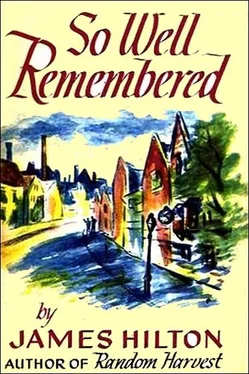Джеймс Хилтон - So Well Remembered
Здесь есть возможность читать онлайн «Джеймс Хилтон - So Well Remembered» весь текст электронной книги совершенно бесплатно (целиком полную версию без сокращений). В некоторых случаях можно слушать аудио, скачать через торрент в формате fb2 и присутствует краткое содержание. Год выпуска: 1945, Жанр: Проза, на английском языке. Описание произведения, (предисловие) а так же отзывы посетителей доступны на портале библиотеки ЛибКат.
- Название:So Well Remembered
- Автор:
- Жанр:
- Год:1945
- ISBN:нет данных
- Рейтинг книги:5 / 5. Голосов: 1
-
Избранное:Добавить в избранное
- Отзывы:
-
Ваша оценка:
- 100
- 1
- 2
- 3
- 4
- 5
So Well Remembered: краткое содержание, описание и аннотация
Предлагаем к чтению аннотацию, описание, краткое содержание или предисловие (зависит от того, что написал сам автор книги «So Well Remembered»). Если вы не нашли необходимую информацию о книге — напишите в комментариях, мы постараемся отыскать её.
So Well Remembered — читать онлайн бесплатно полную книгу (весь текст) целиком
Ниже представлен текст книги, разбитый по страницам. Система сохранения места последней прочитанной страницы, позволяет с удобством читать онлайн бесплатно книгу «So Well Remembered», без необходимости каждый раз заново искать на чём Вы остановились. Поставьте закладку, и сможете в любой момент перейти на страницу, на которой закончили чтение.
Интервал:
Закладка:
In fact, it was neither a lie nor the truth, but some halfway vision in a child’s-eye view of the world, a vision that could start as easily from a lie deliberately told, and as easily end by sincerely believing it. Those three children, for instance; Livia had undoubtedly lied in claiming to have seen them, but later her fancy convinced her that she DID see them, more than once; and this made her forget that she had lied in the first place. Nor was it ever a conscious lie that she saw her father, for by that time the clough was a place where she could see anything and anybody. The high trees arching over the stream as it tumbled from the moorland, the ruins of the old cottages where grass grew through the cracks of the hearthstones, the winding path leading down from the Stoneclough garden to the road—these were the limits of a world that did not exist elsewhere save in Grimm and Hans Andersen and the Tanglewood Tales—a world as young as the children who lived in it and the belief that alone made it real.
And in the other world, meanwhile, she continued to learn Mathematics, Spelling, Geography, History and ‘Scripture’ from Miss Fortescue, who was everlastingly thrilled by the secret that could not yet be told and by her own forbearance in not telling it; she also understood children just enough to feel quite certain that she understood Livia completely, which she never did. Old Sarah, who professed no subtleties, came much closer when she remarked, leaning over the child’s first attempts at arithmetic— “Queer stuff they put into your head, Livia—no wonder you see ghosts after it.” And it was Sarah who saw nothing queer at all in Livia’s question, when Miss Fortescue had informed her that Ben Nevis was the highest mountain in the United Kingdom: “Please, Miss Fortescue, what’s the LOWEST?”
Another war did begin, as Emily had envisaged (but it was between Russia and Japan, and so not one in which an English household had to take sides); meanwhile Livia passed her sixth birthday; meanwhile also the cotton trade boomed and then slumped. This would have mattered more at Stoneclough had not Emily possessed a little money of her own; indeed, it was a subject of bitter comment throughout Browdley, where hundreds had been ruined as a result of the Channing crash, that the family responsible for it seemed to be flourishing just as formerly. But this was not quite accurate. Browdley did not realize how much had been abandoned—the town house in London, the holidays at Marienbad, the platoon of servants; and while to Browdley life at Stoneclough was itself a luxury, to Emily it was an economy enforced by the fact that the house was of a size and style that made it practically unsaleable, and thus cheaper to stay in than to give up. So they stayed —she and Livia and Miss Fortescue and Watson the gardener-coachman- handyman (a truly skeleton staff for such an establishment); and the blacker the looks of Browdley people, as trade worsened and times became harder, the more advantageous it seemed that Stoneclough was so remote although so close —a moorland fastness that no one from the town need approach save in the mood and on the occasions of holidays. All of which, in its own way, conditioned Livia’s childhood. Sundays in summer-time were the days when she must, above all things, remain within the half-mile of garden fence; week-days in winter-time permitted her the greatest amount of freedom. It was easy, by this means, to keep her ignorant of everything except Miss Fortescue’s teachings and a general impression that all nature was kind and all humanity to be avoided.
And Emily, who liked to put things off anyway, kept putting off the time for correcting all this. “Next year perhaps,” she would say, whenever Dr. Whiteside mentioned the matter. He was an old man who had brought both Livia and Livia’s father into the world; he did not greatly care for Emily and doubted the wisdom of most things that she did. “It’s time the child went to school and mixed with people,” he kept urging. “Why don’t you tell her the truth and get it over? You’ll have her self-centred and neurotic if she stays here seeing nobody but you and Sarah and Miss Fortescue… What does John think about it?”
“He left it to me to tell her when I think the moment is right,” replied Emily, with strained accuracy. “She’s only eight, remember.”
But it was just the same when Emily was able to say “She’s only nine” and “She’s only ten”. And by that time also another thing had happened. John had been transferred to a prison in the south of England, and Emily no longer saw him every month. After all, it was a long journey just for the sake of one short interview, and it was possible also to wonder what good it did, either to him or her; letters were much easier.
Not that Emily was a hard-hearted woman—far from it. She had no bitterness against her husband for either the crash or the crime, or even against the country for having jailed him; she had no conviction that he deserved his punishment—nor, on the other hand, that he had been monstrously over-punished. The whole situation was one she could no longer come to terms with at all, since it had passed the stage of romantic interpretation. She was still able to weep whenever she thought of him, but equally able to go without thinking of him for long periods, and the idea of raking the whole thing up by telling Livia was not only distasteful, but something she was a little scared of. Already she was aware of something in Livia—character or personality or whatever one called it—that outclassed her own. For one thing, Livia had no fear—of ghosts, or being alone, or anything else. And also she would sometimes make scenes —curious, nerve-racking scenes that made Emily feel peculiarly helpless. Perhaps Dr. Whiteside was right and the child WAS neurotic— but would the knowledge that her father was in prison make her any less so? It was easy to think not.
Nor was it clear that Livia would be made happier by school, for in addition to hating the idea of it, the child also seemed perfectly happy at Stoneclough. She had far more freedom than children have in many homes; she could play with dogs, cats, chickens, tame rabbits, and William the horse; she liked and was permitted to make cooking experiments in the kitchen and planting experiments in the garden; she could walk endlessly over near-by moorland and through the clough on week-days; she could read library books sent up from Mudie’s in London, and there was that new invention, the phonograph, to amuse her. And on Sundays, to brighten the one day of restriction, old Mr. Felsby usually called. But it did not brighten things so much for Livia, who early formed the opinion that Mr. Felsby was a bore.
Richard Felsby was seventy-eight, oaken in physique, the last of a generation destined to glower (within gilt frames) from above thousands of mantelpieces upon dwindling families. Both the Channings and the Felsbys were, in this matter, typical; once so prolific, they seemed now in danger of reaching a complete full- stop, for only the surviving Richard, the absent John, and the infant Livia could claim direct descent from the original Channing and Felsby who had built up the firm. The last of the Felsbys could not forgive the last of the John Channings—not so much on personal grounds (for Richard, disliking John’s new-fangled business ideas long before the crash came, had dissolved partnership and retired a rich man), but because of the disgrace to the Channing name in a world that still associated a Channing with a Felsby. It was said that the trial and the scandal connected with it had aged Richard considerably, and if so, there were many in Browdley who wished it had done more, for the old man was generally disliked. When younger he had been against drinking, smoking, gambling, dancing, and theatre-going (anything, indeed, that might lessen the week-day efficiency of his employees); but of later years he had mellowed to the extent that he only scowled wordlessly if he came across Livia sewing or reading a novel during one of his Sunday visits. He did not much care for Emily, though he felt he ought to keep an eye on her; he was disappointed in Livia, because she was not a boy to carry on and rehabilitate the Channing name; and, as before remarked, he could not forgive John. But he was old enough both to remember and revere the memory of John’s father, who had died some years before the turn of the century. Friend, partner, and contemporary, this earlier John had been, in Richard’s opinion, the last of the ‘good’ Channings; and it was for his sake, chiefly, that the old man now visited Stoneclough.
Читать дальшеИнтервал:
Закладка:
Похожие книги на «So Well Remembered»
Представляем Вашему вниманию похожие книги на «So Well Remembered» списком для выбора. Мы отобрали схожую по названию и смыслу литературу в надежде предоставить читателям больше вариантов отыскать новые, интересные, ещё непрочитанные произведения.
Обсуждение, отзывы о книге «So Well Remembered» и просто собственные мнения читателей. Оставьте ваши комментарии, напишите, что Вы думаете о произведении, его смысле или главных героях. Укажите что конкретно понравилось, а что нет, и почему Вы так считаете.










